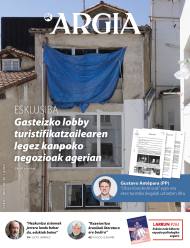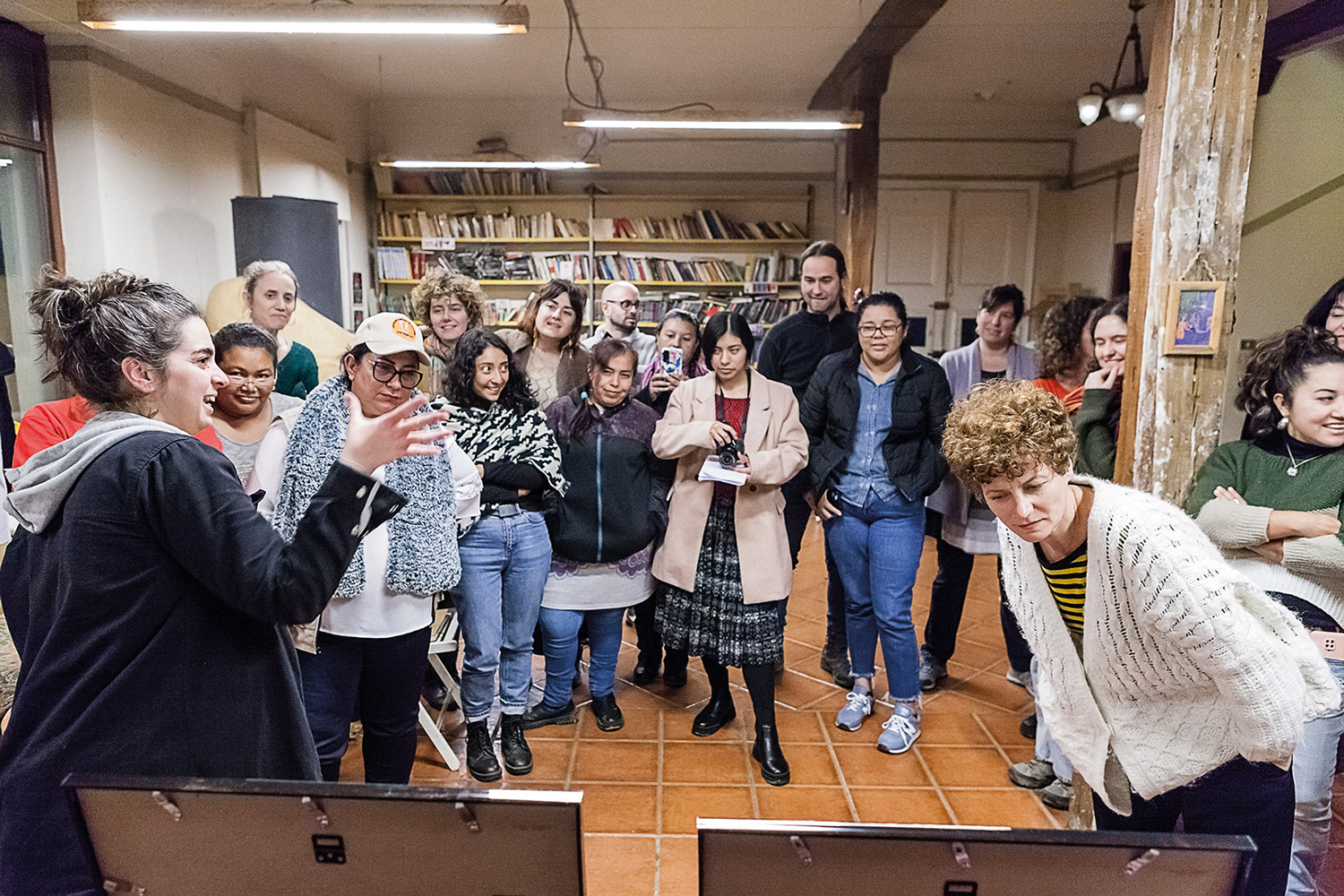"Journalism has never been rated literary."
- One more in the ARGIA function relationship. It has been difficult to shape the idea that has happened almost fifteen years ago, but it has been given to it, and it has to leave the printing press. Koldo Izagirre (Altza-Pasaia, 1953) compiled some of the chronicles that the Basque press brought from 1869 to 2000. They are the “gemstones”, the key to understanding history, a sign of what the First and Second World Wars were also told in Basque. In general, ARGIA has republished in his book A horse in the field of flight. Despite being journalistic texts, they are based on literature.

Like all or most journalistic texts, the chronicle also has a short life. They are published on a date number and included in the newspaper library.
It's the disease of journalism. Daily, daily, daily -- and there's no time. There is no future or past. It's always punctual, or the day before, but current, never ending.
In short, the work of the journalist is not considered literature, nor does the journalist himself see it this way. And yes, it's literature. There's the problem.
J. B. He received writings from Bilbao Batxi in his book Hau mundu arrano hau, along with Iñigo Aranbarri. They said this in the back cover of Batxi: “Author of two hundred chronicles without cataloging. A sailor who is denied writing.” Now, tell me, instead of “sailor,” could we say “journalist?”
I will give you an example, which I too use to understand this issue. Illustrators have been of great importance in journalism, interpreting actuality with images. View old Argia photos, view current media jobs for Iñaki Martiarena Mattin, Eider Eibar, Olariaga, Zaldiero and many more. No one will say that they are not works of art.
And journalism with texts, instead...We have so internalized
that what they do the next day is not worth...
Does it stay at nothing?
We mix book and literature, we believe that literature only appears in books. Now, with this book, you will become literature (laughs). For me, journalism is a genre of literature.
Do we legitimize books? Are we obsessed with making books?
We seem to have an obsession. We've had few books historically, and we're on it. But we've had a lot of publications, and we have literature there as well. That is not being done.
"The chronicle accepts a literary resource and gives a plastic vision to the readers"
You mentioned the lack of time earlier. Isn't the journalist who doesn't have time to upload his texts to literature?
Why do you have to go up? Is journalism at a lower level? Do you think writers could do journalism? They're two genres. The journalist is a writer. He also writes daily. Sometimes good and sometimes less good, like writers.
You have not selected anything from Batxi, nor from Lizardi... We
have turned more to those who have only been published in the media, to unknown texts. There's an amazing material, and I think there's everything to read. If it had been oral literature, we would probably save them better.
Why?On the one hand, because we have the Auspoa section created and powered by Antonio
Zavala. On the other hand, because the song turns the verse into immortal. The singers were able to take advantage of this treasure. This is the advantage of orality, which is transmitted. However, we writers have relegated the work of our predecessors. Like we don't have history.
That past publications have no value...The social
value of journalism has been recognized, but it has rarely been given literary value. Lizardi, Kirikiño, Etxepare Medico... How many more? It is not only the case of chronicles, the same generally happens with articles, debates, editorials...
.jpg)
More or less literature, but you have told me that the chronicles contributed to the book A horse in the field of flight (2023, ARGIA) are “abundant in literature”. Let's try
to define the chronicle. It can be a story without fiction, but also a story starring the journalist. There's the personality, the journalist's ability to tell. How many chronicles, different styles. One of the richest genres in our literature.
Is this another way of knowing the story, not?Thanks to these
chronicles we will know, among others, the number of wars we have experienced in our country: 1936, Algeria, World War II, First... And because we haven't gone back -- the oldest chronicle of the book is that of 1869. Yes, it is a material to understand history, among others.
Individually, besides being legible, they are very interesting chronicles to situate them in time and to know them.
There is a mini-chronicle of Julene Azpeitia... Pilgrimage of a virgin in Andalusia. That day, every year, they take him from the hermitage to the main church. But this time the communists and socialists have also come together in the procession and want to take it to the People’s House, not to the main church. Threats, shocks... And the chronicle ends. “The Virgin hit the main church as the boat catches the bartender at the Cantabrian River hits the port.”
The chronicle accepts a literary resource that gives us a plastic vision. Julene Azpeitia objectively shows us the place, the time and a political-religious environment, but ends with a stylistic implication. This image, the Amabirine-Galine-Church link, gives it a semi-epic semi-tragic dimension. It strengthens the anecdote of the Communist Socialists.
There is an intention.
There's intentionality to influence, and that's also literature. They also perform a linguistic demonstration without putting it into effect. They mix genera, like painters do in the palette.
To cite a text by Ander Arzelus Luzear, dated 1928, narrates the arrival of the “feared storm” from the pier of San Sebastian.
The chronicle has many subgenres. Sea, seafarers, sailors, greens... Bertsolarism has worked hard on this chronicle. Sport, of course, regattas, betting segas, aizkolaris, ball... Also the crimes, we have magnificent series of bertsos, the Fourteen deaths, the Joseph Teism... A couple of days ago we talked to Inazio Mujika about the works of Luzear and how unknown it is.
He also tells how they hanged a young man in the chronicle called Legal Death. It's written in America, in January 1898.
It's a very special story, with lots of details. By writing, it could be translated from English to Basque. I received it from the journal Eskual Herria de Río de la Plata. Gorka Bereziartua told me that it was rare for that news from Los Angeles to appear on one of Río de la Plata. Finally, Imanol Murua warned us that he was the first to appear at Eskual Herria berrikaria in California.
Have you had to adapt the texts?
No, the texts are intact. All we have managed to do is correct the obvious errors of printing and adapt spelling to our times. I say: Juan Luis Zabala gave me a thorough reading and corrected not only the mistakes in spelling, but also in copying. Gorka Bereziartua has collaborated in the selection and many other details.
You have done a great study and you can do more.
ARGIA published a book of interviews with Zeruko Argia a few years ago, by Pilar Iparragirre. There are many such fields. When it was still in Lekaroz, numerous chronicles were published with texts sent by missionaries to China. They're very interesting. Imagine.
"There's intentionality to influence, and that's also literature. They mix genres, like painters do on the palette."
They are lost texts in oblivion.
Even if they existed, few would know. Access to texts has been greatly facilitated today. We have no excuses for that.
If we had to analyze the history of literature, would those journalistic texts like these occupy us a lot, or what?
It's not just chronic. Stories, for example, have been incorporated very late into the history of Basque literature. Literature has been analyzed for years as if there were no modern tales. Mirande, Aresti and he's there. What I said before: if it's not in the book, it's not worth it.
ARGIA’s work was old. The book editor, Gorka Bereziartua, tells in his introduction that in January 2009 he delivered a conference that was remembered by many on the 90th anniversary of ARGIA.
“Mythical” speech, yes (laughs). There came the initial idea... I knew what was there, what was going to come, and I was already looking for the texts.
You've taken the job.
Yes, but it's a nice job. It only takes a little patience. And the truth is that texts of interest are not difficult to detect between moral prosas and political sermons, they facilitate work (laughs).
The title itself, A horse in the field of flight, comes from a text in the book. Joseba
Zubimendi, witness of the incineration of Gernika, reports the bombing of Gernika. We also have the most authentic document of the Gernika bombing. Joseba Zubimendi -- great journalist, great writer.
25 urte beteko ditu aurten Gara egunkariak. Ez da erraz izan. Teknologiak ekarritako iraultzari neurria hartuagatik ere, Espainiako auzitegietako epaileek erabakitako oztopo arbitrarioek egunean eguneko jarduna baldintzatu dute. Mirari hutsa, Iñaki Soto zuzendariaren... [+]
Paternalism has taken on current journalism. Maybe he had kidnapped him a long time ago. This nostalgia gene continues in the trade, elevating all the achievements of the past. Anyone can know our awards: partiality, sensationalism, the heart press and many more. Because a large... [+]
Berrian lan egiten duen kazetariak, Euskal Telebistaz liburua idatzi berri du Txoria hodei artean, ETB lehen eta gero. Galdera batekin abiatzen du liburua kazetariak: 40 urte bete dituen Euskal Telebistak behar den gisan arrapostu ematen al dio euskal jendartearen egungo... [+]














